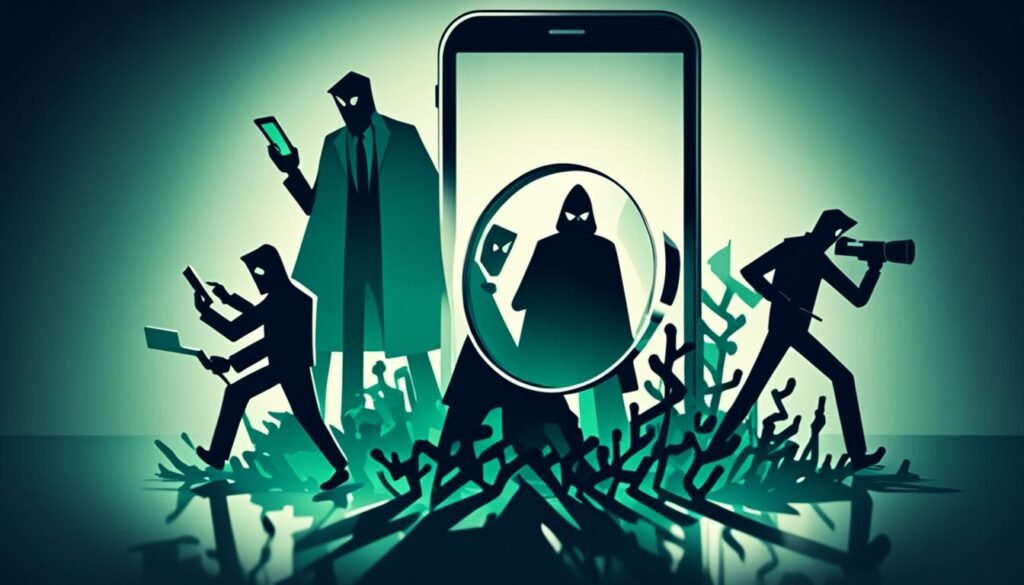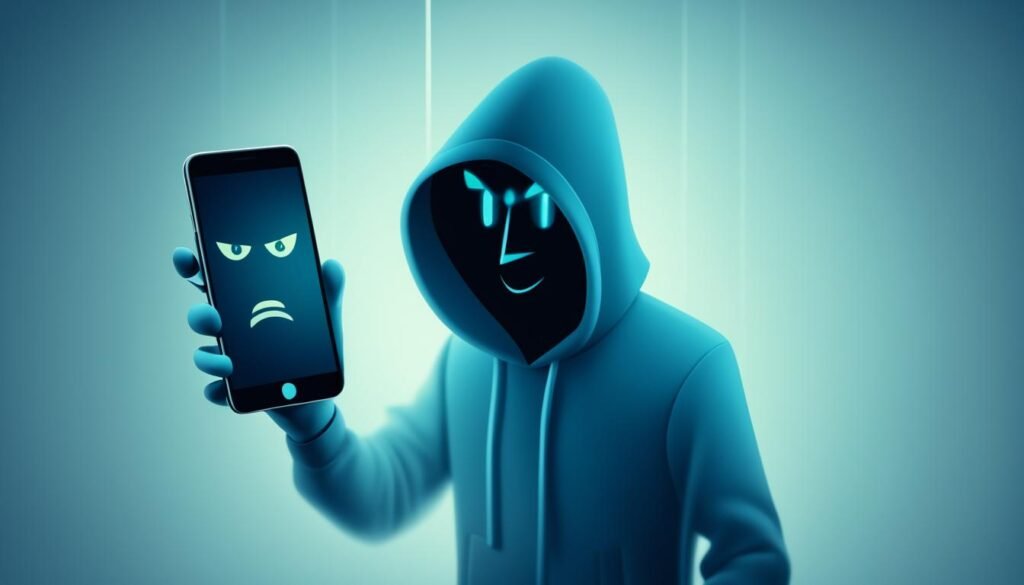Ever thought your favorite apps might be tracking you? Are you worried about privacy risks with data tracking? It’s time to protect your personal data from apps tracking you.
Nowadays, we can’t live without our smartphones. We use apps for chatting, fun, and getting things done. But, beware! Some popular apps could invade your privacy. They might collect your info without you knowing.
No need to panic, though. This article will guide you through protecting your digital privacy. We’ll teach you how to avoid app spying. By understanding digital privacy and learning to protect yourself, you’re all set.
So, are you ready to defend your digital privacy? Dive in with us. Discover how to keep your personal data safe from spying apps.
The Importance of Privacy in the Digital Age
In today’s world, everything is online, making privacy often forgotten. But it’s important to remember, a little personal info can go a long way for someone with bad intentions. They could steal your identity or get into your accounts easily. With privacy-threatening apps on the rise, knowing the risks and defending your data is crucial.
Your digital privacy faces threats from various corners. Risks come from apps, third-party data collectors, and the need for secure smartphones. A privacy breach could lead to financial loss, hurt your reputation, or even result in identity theft. Taking steps to protect your info is not just smart; it’s necessary.
Imagine your personal data, collected by an app, falling into the wrong hands. It could mean someone getting into your social media, harming your personal life and relationships. Worse, your info could be used for phishing or fraud, leading to financial trouble and a lot of stress.
You can lower these risks by being careful about the apps you install. Know their privacy policies well. Many apps share your data with advertisers or other third parties. So, it’s key to check permissions before saying yes.
Keeping your smartphone’s security tight is also critical. Make sure to regularly check and update your security settings. Keeping your device and apps updated is vital as updates often fix security holes. Not updating may leave your device open to attacks.
Knowing how to protect your digital privacy is essential. Learn about common ways personal data is attacked, like phishing or social tricks. Knowing these can help you spot and dodge threats.
Keeping your privacy safe is a constant effort. Be alert and informed about new privacy issues and digital risks. This helps ensure you’re doing everything you can to protect your personal data.
How to Protect Yourself from App Surveillance
It’s essential to act before you download apps to keep your privacy safe. These steps help keep your personal information secure.
Download from Reputable App Stores
Download apps only from trusted places like Google Play or the Apple Store. They have strong security to lower the risk of harmful apps. This helps keep your data safe.
Grant Permissions with Caution
Think carefully when apps ask for permissions. Check the permissions apps want and turn off the ones you don’t need. If the permissions seem unrelated to what the app does, it could mean privacy issues.
Conduct App Research
Do research before getting an app. Look at what other users say and their experiences. Look for any complaints about privacy problems or data tracking. Knowing more about an app helps you protect your privacy.
Stay Vigilant and Regularly Review Permissions
Keep an eye on your privacy by checking the permissions apps use. Notice if an app’s behavior or permissions change after updates. Make sure the permissions make sense for what the app does.
Privacy Protection Apps
You can also use special apps to watch and manage other apps’ permissions. These tools add more security. They help you watch for privacy risks closely.
| App | Features |
|---|---|
| AppLock | Allows you to set a password or pattern lock for individual apps, adding an extra layer of security. |
| Privacy Knight | Monitors permissions and alerts you to any suspicious behavior or excessive data tracking. |
| MyPermissions | Enables you to view and manage app permissions, providing insights into potential privacy risks. |
Apps to Be Concerned About
Some apps have caught the eye of cybersecurity experts because they could put your privacy at risk. Knowing about these apps and the dangers they pose is crucial. Here are some examples:
- CamScanner: CamScanner, a widely used document scanning app, was found to have a harmful component. This flaw could put your data security at risk. It’s best to steer clear of this app and look for other ways to scan documents.
- Weather Apps: Some weather apps are being questioned for how much data they collect. They might give you the weather forecast, but it’s wise to think twice before giving them too much access. Make sure to check their privacy policies carefully.
- Social Networking Apps: Apps like Facebook and Instagram are known for tracking user data. They use this information for targeted ads and more. You might want to try more private options that respect your data.
Maintaining your digital privacy means knowing your apps and the risks they carry. Always check your privacy settings and app permissions. Looking for apps that focus on protecting your privacy can make a big difference in safeguarding your personal information.
Risks Associated with WhatsApp and Facebook Messenger
Messaging apps like WhatsApp and Facebook Messenger are key in our daily chats. But it’s vital to know the risks they may pose. These include threats to your smartphone security and personal data collection.
Attackers might use these apps’ weaknesses to access your device. They could tap into your camera, microphone, and contacts. This might breach your privacy and put your info at risk.
Facebook Messenger doesn’t use end-to-end encryption. So, conversations might not be fully safe. Facebook’s team could access these chats, leading to privacy worries.
To lower these risks, always update your messaging apps. Developers fix security issues and boost app safety with new versions. Updating helps guard against hacks.
If you’re worried about smartphone security and personal data safety, think about using Signal. Signal’s robust encryption and privacy focus make it a secure choice.
| Messaging App | End-to-End Encryption |
|---|---|
| Yes | |
| Facebook Messenger | No |
| Signal | Yes |
Being aware of the risks with WhatsApp and Facebook Messenger helps. You can take steps to protect your smartphone security and keep your personal data safe.
The Dangers of Flashlight Apps

Free flashlight apps can be risky because they often gather and share your personal data. These applications ask for access to things they don’t need, like your contacts or to record audio. This can put your privacy at risk. You’re better off using the flashlight that’s already on your smartphone.
The Risks of Personal Data Collection
Downloading a free flashlight app might let it access your private information. This can include where you are, who you know, and even listening in through your microphone. They gather this info to target you with ads or sell it to others.
Privacy Concerns with Unnecessary Permissions
Flashlight apps often ask for more permissions than they really need. They don’t need to know who you’re calling or listen to you for a flashlight to work. Giving them these permissions can lead to your data being misused.
Safeguarding Your Privacy
Here are some tips to keep your personal information safe:
- Uninstall any flashlight apps from your phone.
- Use the flashlight that comes with your phone instead.
- Be cautious about the permissions you give apps.
- Check and update app permissions regularly.
Following these steps helps lower the risks from flashlight apps. Your personal information stays safe and secure.
Angry Birds and Other Gaming Apps
Gaming apps are more popular than ever, providing fun for people worldwide. But we must be careful about the risks they carry. These include dangers to our digital privacy and the gathering of personal info.
Angry Birds is a game many love and it’s quite addictive. However, it has faced issues with privacy. It once leaked data like phone numbers and locations. The game’s makers have worked to fix these problems. Yet, it’s key for players to keep their app updated. This reduces the risk of data being exposed.
But it’s not only Angry Birds that we should worry about. Many gaming apps might take your personal information without you knowing. This could be your location, device details, or even your personal likes and habits. While some of this is needed for the game to work, we should still be careful.
To keep your privacy safe while gaming, follow these steps:
- Review app permissions: Look closely at what permissions a game asks for before you download it. Only give it what’s really needed for the game to work. Stay away from apps that ask for too much.
- Update regularly: Make sure your apps are always the latest version. Updates often fix security issues which helps keep your data safe.
- Consider alternative games: If you’re worried about a game’s privacy policy, try others that are better with privacy and data protection.
By being smart and staying aware of the risks, you can still have fun with gaming apps. Just make sure to keep your privacy first and take steps to protect your information.
Protecting Yourself with Camera and Microphone Trackers
Smartphone security isn’t just about passwords and encryptions. It’s also about who can use your phone’s camera and microphone. Many don’t think about app permissions as a privacy risk. But they are. Knowing which apps can access these parts of your device is key. It helps keep your personal data safe from prying eyes.
There are special apps to help you watch over your camera and microphone. They alert you when an app tries to use them without you saying it’s ok. This way, you catch these snoopers red-handed. And you can stop them from invading your privacy.
By using these tracking tools, you’re always one step ahead. You’ll know right away if an app is trying to sneak into your personal space. Making these trackers part of your daily security checks is smart. They’re a solid defense against unwanted spying on your personal info.
Additional Hardware for Privacy Protection
For more privacy, think about using physical tools to keep your smartphone’s camera and mic safe. These simple tools can offer an extra security layer against unwanted access to your data.
Vinyl Webcam Covers
Vinyl webcam covers are a great choice. They’re small sticky covers that you put on your camera lens. You can block the camera when not using it. This helps keep you safe from hackers and spying, keeping your privacy safe.
Sliding Camera Covers
Sliding camera covers are also great for your smartphone’s camera. They attach to your device and have a slide to cover or uncover the camera. This gives you an easy and safe way to block the camera, so you can relax knowing your privacy is secure.
Microphone Blockers
It’s also important to protect your smartphone’s mic. Microphone blockers are one solution. They plug into your audio jack and turn off the mic, blocking any spying or unauthorized recordings. With a microphone blocker, your talks stay just between you and the person you’re talking to.
Using vinyl webcam covers, sliding camera covers, and microphone blockers helps protect your smartphone. These affordable, easy solutions give you comfort in a world that’s always connected.
Taking Control of Your Digital Privacy
Keeping your digital privacy safe is very important in today’s world. By being careful with the apps you use and their permissions, you can protect your personal data. Here are some key steps to help you:
Checking app permissions regularly is key. It helps you see how your data is used. Take time to figure out what permissions an app really needs. Say no to any that aren’t needed. This helps keep your private information safe and reduces data collection.
Updating your apps is also crucial. Updates often fix security problems. They make your apps safer against privacy threats. By updating regularly, you keep your digital life more secure.
Lastly, think about using safer app options. Some apps take a lot of personal data. Find and use apps that protect your privacy better. Choose ones with encryption, good privacy rules, and user reviews that show they care about privacy.


